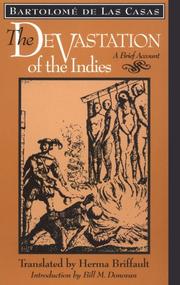| Listing 1 - 10 of 482 | << page >> |
Sort by
|
Book
ISBN: 0300245262 0300218125 9780300245264 9780300218121 Year: 2019 Publisher: New Haven
Abstract | Keywords | Export | Availability | Bookmark
 Loading...
Loading...Choose an application
- Reference Manager
- EndNote
- RefWorks (Direct export to RefWorks)
The first part of a sweeping two-volume history of the devastation brought to bear on Indian nations by U.S. expansion In this book, the first part of a sweeping two-volume history, Jeffrey Ostler investigates how American democracy relied on Indian dispossession and the federally sanctioned use of force to remove or slaughter Indians in the way of U.S. expansion. He charts the losses that Indians suffered from relentless violence and upheaval and the attendant effects of disease, deprivation, and exposure. This volume centers on the eastern United States from the 1750s to the start of the Civil War. An authoritative contribution to the history of the United States' violent path toward building a continental empire, this ambitious and well-researched book deepens our understanding of the seizure of Indigenous lands, including the use of treaties to create the appearance of Native consent to dispossession. Ostler also documents the resilience of Native people, showing how they survived genocide by creating alliances, defending their towns, and rebuilding their communities.

ISBN: 0801844304 9780801844300 Year: 1992 Publisher: Baltimore: Johns Hopkins University press,
Abstract | Keywords | Export | Availability | Bookmark
 Loading...
Loading...Choose an application
- Reference Manager
- EndNote
- RefWorks (Direct export to RefWorks)
Book
ISBN: 9782906462762 2906462764 Year: 2000 Publisher: Paris: Chandeigne,
Abstract | Keywords | Export | Availability | Bookmark
 Loading...
Loading...Choose an application
- Reference Manager
- EndNote
- RefWorks (Direct export to RefWorks)
Book
Year: 1935 Publisher: Gloucester, Mass.: Smith,
Abstract | Keywords | Export | Availability | Bookmark
 Loading...
Loading...Choose an application
- Reference Manager
- EndNote
- RefWorks (Direct export to RefWorks)
Book
ISBN: 848604202X 9788486042028 Year: 1991 Publisher: Murcie: Instituto teologio Franciscano,
Abstract | Keywords | Export | Availability | Bookmark
 Loading...
Loading...Choose an application
- Reference Manager
- EndNote
- RefWorks (Direct export to RefWorks)
Book
Year: 1782 Publisher: Madrid: Por D. Joachin Ibarra,
Abstract | Keywords | Export | Availability | Bookmark
 Loading...
Loading...Choose an application
- Reference Manager
- EndNote
- RefWorks (Direct export to RefWorks)
Book
Year: 1968 Publisher: Berlin : Colloquium Verlag,
Abstract | Keywords | Export | Availability | Bookmark
 Loading...
Loading...Choose an application
- Reference Manager
- EndNote
- RefWorks (Direct export to RefWorks)
Book
Abstract | Keywords | Export | Availability | Bookmark
 Loading...
Loading...Choose an application
- Reference Manager
- EndNote
- RefWorks (Direct export to RefWorks)
Book
Year: 1760 Publisher: Amsterdam : M. Rey,
Abstract | Keywords | Export | Availability | Bookmark
 Loading...
Loading...Choose an application
- Reference Manager
- EndNote
- RefWorks (Direct export to RefWorks)
Book
ISBN: 1496219627 9781496219626 9781496230331 1496230337 9781496230324 1496230329 Year: 2022 Publisher: Lincoln
Abstract | Keywords | Export | Availability | Bookmark
 Loading...
Loading...Choose an application
- Reference Manager
- EndNote
- RefWorks (Direct export to RefWorks)
"By examining historical records and drawing on the work of anthropologists, archaeologists, ecologists, and psychologists, We Are Not Animals sets out to answer questions regarding who the Indigenous people in the Santa Cruz region were and how they survived through the nineteenth century. In We Are Not Animals Martin Rizzo-Martinez traces tribal, familial and kinship networks through the missions' chancery registry records to reveal stories of individuals and families and shows how ethnic and tribal differences and politics shaped strategies of survival within the diverse population that came to live at Mission Santa Cruz. Between 1770 and 1900, the linguistically and culturally diverse Ohlone and Yokuts tribes adapted to and expressed themselves politically and culturally through three distinct colonial encounters with Spain, Mexico, and the United States. They persevered through a variety of strategies developed through social, political, economic, and kinship networks that tied together Indigenous tribes, families, and individuals throughout the greater Bay Area, and they employed survival tactics such as organized attacks on the mission, the assassination of an abusive padre, flights of fugitives, poisonings, and arson. In some cases, they also collaborated with certain padres, tracked down fugitives, and strategically employed service, labor, and musical performance. We Are Not Animals illuminates the stories of Indigenous individuals and families to reveal how Indigenous politics informed each of their choices within a context of immense loss and violent disruption."-- "We Are Not Animals traces the history of Indigenous people in the Santa Cruz area through the nineteenth century, examining the influence of Native political, social, and cultural values and these people's varied survival strategies in response to colonial encounters"--
| Listing 1 - 10 of 482 | << page >> |
Sort by
|

 Search
Search Feedback
Feedback About UniCat
About UniCat  Help
Help News
News